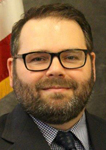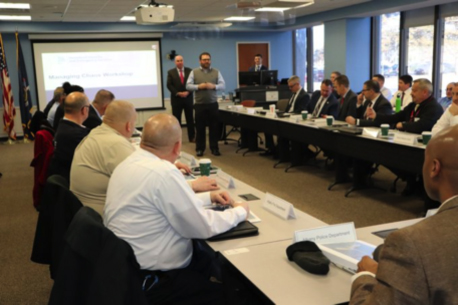It is important for academics and practitioners to collaborate and learn from each other. Academic research can help to address real-world challenges, and practitioners are uniquely positioned to provide meaningful insight to help shape research agendas.
Academics and practitioners often view the world very differently, especially in first responder-oriented disciplines such as homeland security (narrowly defined) and emergency management. Academics conduct research, examine practices from an evidence-based perspective, and formulate theories, whereas practitioners focus on the immediate real-world operational realties and intense pressures they face each day. Academics are often criticized for being too high-minded, abstract, and detached from reality. As such, practitioners sometimes fail to appreciate the value of research and are often unwilling to learn and adapt for a multitude of reasons. These stereotypes contain some truth. However, as the discipline of homeland security has matured, academics and practitioners are increasingly recognizing the importance of learning from each other and collaborating in the production of usable, actionable knowledge. This “pracademic” approach to homeland security can produce relevant and useful insights for all parties involved.
Overcoming Obstacles
The proliferation of homeland security and emergency management degree programs has been coupled by a growth in basic and applied academic research as well. Researchers from colleges and universities are examining a myriad of homeland security issues (broadly defined), to include the study of terrorism, the use of unmanned aircraft systems, and disaster resilience, just to name a few areas of academic interest. Additionally, there are now several homeland security-related academic journals to complement the previously existing disaster science and emergency/crisis management journals for researchers to publish their work.
Unfortunately, practitioners often do not have easy access to or the time to read and digest the various academic-oriented research products. Even when they do, academics generally write their articles for other academics, not practitioners. Dense journal articles with numerous citations and academic theories rarely resonate with practitioners. Additionally, first responders and other homeland security officials must contend with an ever-evolving list of threats and hazards, to include extreme weather, terrorism, public health emergencies, and many other concerns. The sheer volume and pace of work – especially for state and local agencies – can be overwhelming. Many agencies are focused on addressing the issue of the day or immediate challenges with little ability to dedicate any effort to more strategic-level issues. Furthermore, the “peer review publish or perish” pressures faced by tenure track academics (already juggling academic research projects, teaching, and university service/administration demands) often create strong disincentives to collaborate with practitioners – especially for vulnerable junior scholars.
Despite the obstacles, the urgent nature of the threats and hazards communities face makes it clear that academics and practitioners must make time to collaborate and look for opportunities to work together. Congress, the U.S. Department of Homeland Security, and many other federal agencies have encouraged the formation of multi-university Centers of Excellence, funded research, and encouraged the formation of mixed scholar-practitioner communities focusing on natural hazards and emergency management education. This approach is already yielding important results. For example, the collaboration between University of Delaware Professor Joseph Trainor and first responder practitioner Tony Subbio on Critical Issues of Disaster Science and Management paired researchers and practitioners to explore key issues of mutual and public interest. Impact360 is another new and promising effort that seeks to connect research and practitioners.
Collaborating Through the Chaos
State and local homeland security and emergency management agencies should also be exploring new ways to collaborate with their academic counterparts. One such example of an effective academic and practical collaboration at the state level relates to the creation of a “Managing Chaos” workshop for senior officials. With funding support from the Federal Emergency Management Agency’s (FEMA) Complex Coordinated Terrorist Attack program, the New York State Division of Homeland Security and Emergency Services (DHSES) worked with both academics and practitioners to develop a half-day workshop for senior officials, to include political leaders and first responder agency executives. The workshop involves facilitated discussions around the concepts of crisis leadership, crisis decision-making, and crisis communication.
In developing the workshop, DHSES collaborated with several academic institutions, including the College of Emergency Preparedness, Homeland Security, and Cybersecurity at the State University of New York at Albany, and the Center for Homeland Defense and Security at the U.S. Naval Postgraduate School. These entities were able to provide DHSES with the latest academic thinking related to crisis management. In addition, DHSES relied heavily on the concepts outlined in The Politics of Crisis Management, Meta-Leadership, and other contemporary academic works. Practical perspectives were incorporated as well, to include the insights and lessons learned from jurisdictions that dealt with complex insights, to include Orlando, Las Vegas, San Bernardino, Aurora, and others. DHSES also collaborated extensively with Daniel Linskey, the former superintendent-in-chief of the Boston Police Department and incident commander during the Boston Marathon Bombing. Linskey’s real-world experiences further amplified the academic research. The result of this academic/practitioner collaboration is a unique workshop that provides senior officials with a broad, yet useful, perspective on how to better manage crisis situations based on proven techniques and strategies.
To date, DHSES has delivered the workshop to more than 200 senior officials from across New York with very positive feedback. The research and real-world insights resonate with the participants, plus the workshop concludes with a scenario-based exercise using mock news clips that help to reinforce the learning objectives. This type of hands-on pedagogy is particularly relevant for adult learners, as they tend to learn better by doing and appreciate the opportunity to apply the concepts, not just listen to them.
Most state and local homeland security and emergency management agencies are not overrun with extra staff and time, so partnering with academic institutions can serve as a force multiplier. In addition to helping with research, colleges and universities can also provide interns, faculty-supervised student “consulting” teams (capstone projects), and other types of support. Managed effectively and in a spirit of mutual collaboration and respect, the academic/practitioner partnership can yield impressive results and produce useful products and insights. Yet, like any relationship, it takes time, commitment, and communication to succeed. Therefore, academics and practitioners must be willing to invest the necessary level of effort.

Terry Hastings
Terry Hastings is the senior policy advisor for the New York State Division of Homeland Security and Emergency Services (DHSES) and an adjunct professor for the College of Emergency Preparedness, Homeland Security and Cybersecurity at the State University of New York at Albany. He oversees the DHSES policy and program development unit and a variety of statewide programs and initiatives.
- Terry Hastingshttps://www.domprep.com/author/terry-hastings
- Terry Hastingshttps://www.domprep.com/author/terry-hastings
- Terry Hastingshttps://www.domprep.com/author/terry-hastings
- Terry Hastingshttps://www.domprep.com/author/terry-hastings

Eric Stern
Eric K. Stern, Ph.D., is professor of political science at the College of Emergency Preparedness, Homeland Security, and Cyber-Security at the University at Albany (SUNY). He holds a Ph.D. from Stockholm University and a B.A. from Dartmouth College. He has published extensively in the fields of executive leadership, crisis and emergency management, crisis communication, resilience, security studies, foreign policy analysis, and political psychology.
- This author does not have any more posts.






